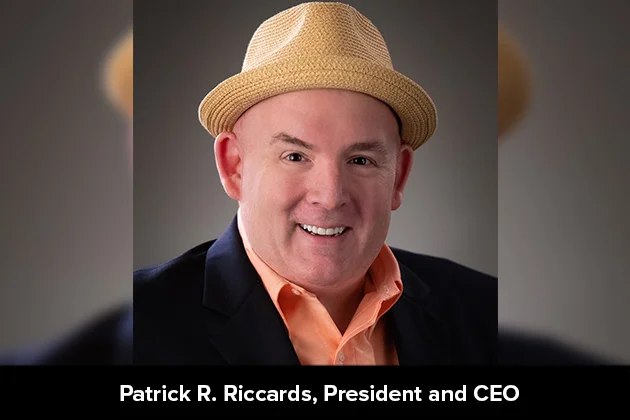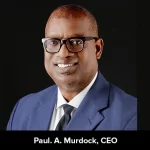Entrepreneurship has always been in the cards for Patrick. Being a creator at heart, Patrick R. Riccards started his first business nearly 15 years ago, right after his daughter’s birth. A proud father to two children, Patrick always wanted to continue his career growth, while having the time and flexibility for his kids.
As a passionate individual with a bigger dream, Patrick sees failure as one of the greatest learning tools for a new business. He shares, “We don’t fear failure. We fail fast, we don’t repeat failures. If we don’t experience failure and setbacks, then we simply aren’t innovating.”
This philosophy has guided his leadership of Life After Hate. The organization began a dozen years ago, as a number of former violent extremists, individuals who were able to show the strength to get themselves out of that life and become positive influences in our civil society, decided to come together and share their life lessons to help others leave violent extremist groups and online hate spaces.
Today, Life After Hate emerged as the industry leader in helping individuals disengage and deradicalize from violent extremism, providing the tertiary care services and public education needed to make meaningful change. Patrick, the CEO of Life After Hate, interacted with the CEOViews team to share detailed insight into his entrepreneurial journey.
Finding Inspiration
Patrick finds inspiration from one of his mentor. A mentor once taught him a valuable life lesson, “If you can dream it, then you can do it.” Over the course of his career, Patrick made this his motto and chased his dreams. His portfolio is focused on purpose-driven work. He wanted to do everything that is necessary to change hearts and minds and ultimately improve society for its good. Purpose-driven work can be frustrating and messy, but it is necessary. It requires one to see the world not as it is, but what it can be and what it needs to be. As a CEO, Patrick sees himself as a coach, an innovator, and an agitator. Each of those three hats is necessary to lead that work.
We don’t fear failure. We fail fast, we don’t repeat failures. If we don’t experience failure and setbacks, then we simply aren,t innovating.
Approach To Make A Positive Change
With the commitment to achieve something big, Patrick pushes himself each day. He builds awareness of Life After Hate and its work, to make a positive difference and give back to the community. He shares, “To some, this work can seem dangerous. To others, it can just be uncomfortable. My job is to make sure we, as a nation, know there is a real problem when it comes to violent extremism, that there are solutions out there to address the growing problem, and that Life After Hate is one of the leading solutions available. I am our lead evangelist. It is my job to make sure we have the resources to do the work and do the it well. As CEO, I am a storyteller. And I’m constantly working to improve the Life After Hate story and to ensure that more and more people hear it.”
Life Changing Programs
It is not every organization that is eager to work with violent extremists, helping them see the error in their ways and assisting them in rejoining our civil society. The work is hard, the work is complicated, and the work is messy.
At Life After Hate, the organization takes professionalism and standards seriously. The team embodies the company’s mission and the values. By bringing together licensed professionals and “former” extremists to serve the clients, they are able to help individuals identify what they need to leave hate and violence and set and manage their goals to survive. Deradicalizing and disengaging from violent far-right extremists’ groups is not easy, but the dedicated team helps all see that a new life is possible.
In addition to the personalized services that are provided to the ones looking to exit lives of extremism, Life After Hate also spends a lot of time educating various stakeholder groups on violent extremism, its root causes, and how one can successfully exit that life. They work with mental health professionals, law enforcement, government, and other such entities to address these concerns.
Domestic terrorism is a very real issue in the United States, and growing more threatening by the day. Life After Hate is doing all it can to both raise awareness of this dangerous issue and help reduce its impact on society.
Navigating Through Challenges
Change is hard. Most people resist change, trying to find positive attributes in the status quo so they don’t have to put in the hard work. They see change as scary. As a result, one of the greatest difficulties is helping individuals see that change is necessary and valuable.
Speaking about the challenges he faced on the course of his career, Patrick shared, “Earlier in my career, I thought it sufficient to explain what we are doing in the pursuit of change. I quickly learned that I instead needed to focus on the why, explaining why we were doing it. We overcome challenges by working hard to get build supporters, advocates, and champions who agree with why we are trying to do what we are doing.”
Life After Hate is set launch several new public engagement campaigns this year to help loved ones better engage with the extremists in their lives.
Constantly Improving To Meet The Needs
As a social entrepreneur, Patrick believes that success is temporary. One must constantly work, innovate, improve, measure, and repeat in order to remain successful. At Life After Hate, the success comes from honoring and building on the mission and the successes of the past to constantly improve and meet the needs of the future.
Life After Hate remains nimble and constantly adapts to fulfil its mission. Three commitments are now part of their DNA. First, they believe in data. Second, they believe in transparency. Third, and most important, they believe that licensed mental health professionals and social workers must be part of the process and must be trained both in how to identify and address risks, working in tandem with peers who have literally walked in the same boots as current violent extremists.
Future Outlook
Patrick is very excited by the future of Life After Hate. He believes that there is much to be done to confront violent extremism in the United States and help individuals deradicalize and disengage from such behaviors. Moving forward, Life After Hate is set launch several new public engagement campaigns this year to help loved ones better engage with the extremists in their lives. They are committed to help law enforcement better understand how to engage with violent extremists to reduce acts or domestic terrorism. They are working to ensure that the latest research on violent extremists is being used by the medical profession.
Elaborating further, Patrick shared, “We are launching two major initiatives this year, which directly address our mission and help us reach those who are most in need of Life After Hate. The first is focused on veterans of the U.S. armed services, helping them avoid or exit lives of violent extremism.
The second is a public engagement effort called The Daily Former, a new podcast and education program that offers a supportive environment for people who want to leave extremism and start a new life.
Each day I wake up asking what we can do to better serve our clients and the community at large. Those reflections provide a lot of content for the Life After Hate team to consider as we look at the new opportunities available to us.”












